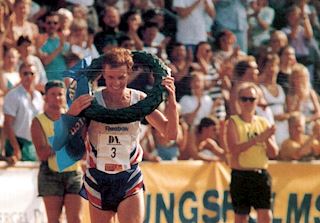AIMS Secretary Hugh Jones on race organization

We had the pleasure to interview the world-renowned marathoner Hugh Jones who holds the position of Secretary AIMS (Association of International Marathons and Distance Races). AIMS is a member-based organization of more than 400 of the world’s leading distance long-distance races, from over 100 countries and territories.
What is the role of AIMS today?
AIMS' founding mission was to 'foster and promote’ distance running throughout the world. The early priority of ensuring the integrity of race measurements has been a major achievement but remains a demanding role.
Have AIMS focus areas changed?
Apart from some of the technical aspects AIMS concentrates on offering its 420 members a platform from which they are better able to project their event to an international audience and bring in international tourist runners. This is important for any race because if they manage to do this they will attract the support of their city authorities - which is an essential condition for a race to exist.
Did you work differently 10-15 years ago compared to now?
I have been AIMS' secretary for 21 years and it was the first 5 years during which tools of communication changed so radically. Most of my work is now based on websites and email. The job would be impossible to do if it were not so. To think I used to send faxes rather than email in the first year of the job...
What will AIMS need to provide to be a valuable organization also in the future?
A lot of this is constant in principle - we need to provide a forum in which members can share knowledge and experience and more easily make arrangements among themselves which are mutually beneficial.
Which are the main challenges for race organizers today?
It depends where you are in the world. I spend a lot of time in India and the biggest challenge there is still ensuring that courses are accurate. No matter what added value there is in terms of T-shirts and medals etc, a lot of the meaning of running is lost when you can't be sure the time is accurate for the distance.
Which are the key trends within race organizing, e.g. smaller races, more diverse landscape etc?
There are all kinds of different growth areas. In terms of geography, Russia, China and India are all showing huge increases in the number of races being organised. The big races worldwide are mostly still growing or reinforcing their market appeal by capping entries early. Then there are the 'boutique' high-end races like Antarctica, North Pole, Sahara, Great Wall and Bhutan - where people pay huge sums in order to participate.
How is a runner different today, what does he/she expect from race organizers?
There is a lot more expectation and a lot more has to be delivered to keep people happy but one aspect has gone backwards: course measurement. Both organisers and runners seem to think that GPS is a valid method of determining the length of a running course - but it varies from being a little too wide of the mark to being wildly inaccurate. No matter how much you explain the issues they still can't kick the feeling that what they read on their wrist is like a watch - reliable to a negligible margin of error. It just isn't so.
Hugh on running today
Best marathon memories as an athlete?
Winning the AAA Marathon (English Championships) in 1981 where I improved by five minutes to 2:14 on a hilly course. I then knew that I had what it took to become an international marathon runner.
Worst marathon memory?
Pulling out of 1982 European Championships with injury a month before the event and pulling out of 1988 Olympic Games with injury two months before the event.
How much and how do you run today?
I still run for everyday practical purposes - to the shops or to the train station. But I was hit by a car seven years ago and it damaged my hip to the extent that I know I am carrying myself differently and feel the strains slowly start to build up in the lower back. The most I would now try to run, and slowly, would be about 10km.
What about your children. Are they runners or are they interested in other sports?
No - none are runners although they have all dabbled a bit. My middle daughter (25) debuted in the 2017 London Marathon with 4:02
London is a world leading sports city. Can you as a Londoner give some ideas where to run?
I was born in London and have lived there nearly all of my life. There are a lot of parks to run in and abandoned railway tracks or canal townpaths you can run on to get between them. It’s a good place to be even when the running you can do is as limited as it is for me.
Key Facts Hugh Jones
Hugh Jones has been AIMS Secretary since 1 July 1996, after a successful career as a marathon runner (from 1981) He was born in London in 1955. In 1978 he ran and won his first marathon (2:25). In 1981 he won the English Championships with the time of 2:14.
His first major win was the 1982 London Marathon in a time of 2:09:24 – at the time the 9th fastest ever recorded. He competed in city marathons and championships in the 1980s and branched out into athletics journalism during the 1990s. At this time he also qualified as an international course measurer. He became editor of Distance Running Magazine in 2000. He still lives in London.
Hugh held the record of Stockholm Marathon with 2:11:37 for 33 years(!) In 2016 that time was beaten by Stanley Kiprichchir Koech from Kenya with 2.10.58











